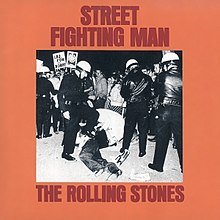Street Fighting Man
| "Street Fighting Man" | ||||||||||||||||||||||||
|---|---|---|---|---|---|---|---|---|---|---|---|---|---|---|---|---|---|---|---|---|---|---|---|---|
 |
||||||||||||||||||||||||
| Single by The Rolling Stones | ||||||||||||||||||||||||
| from the album Beggars Banquet | ||||||||||||||||||||||||
| B-side | "No Expectations" (US) "Surprise, Surprise" (UK) |
|||||||||||||||||||||||
| Released | August 1968 (US) 20 July 1971 (UK) |
|||||||||||||||||||||||
| Format | 7" | |||||||||||||||||||||||
| Recorded | April–May 1968 | |||||||||||||||||||||||
| Genre | ||||||||||||||||||||||||
| Length | 3:09 3:14 (Album version) |
|||||||||||||||||||||||
| Label | London 45 LON 909 (US) | |||||||||||||||||||||||
| Writer(s) | Jagger/Richards | |||||||||||||||||||||||
| Producer(s) | Jimmy Miller | |||||||||||||||||||||||
| The Rolling Stones singles chronology | ||||||||||||||||||||||||
|
||||||||||||||||||||||||
|
||||||||||||||||||||||||
| 10 tracks |
|---|
|
"Street Fighting Man" is a song by English rock band The Rolling Stones featured on their 1968 album Beggars Banquet. Called the band's "most political song",Rolling Stone ranked the song #301 on their list of the 500 Greatest Songs of All Time.
Originally titled and recorded as "Did Everyone Pay Their Dues?", containing the same music but very different lyrics, "Street Fighting Man" is known as one of Mick Jagger and Keith Richards' most politically inclined works to date. Jagger allegedly wrote it about Tariq Ali after he attended a 1968 anti-war rally at London's US embassy, during which mounted police attempted to control a crowd of 25,000. He also found inspiration in the rising violence among student rioters on Paris's Left Bank, the precursor to a period of civil unrest in May 1968.
On the writing, Jagger said in a 1995 interview with Jann Wenner in Rolling Stone,
The song opens with a strummed acoustic riff. In his review, Richie Unterberger says of the song, "...it's a great track, gripping the listener immediately with its sudden, springy guitar chords and thundering, offbeat drums. That unsettling, urgent guitar rhythm is the mainstay of the verses. Mick Jagger's typically half-buried lyrics seem at casual listening like a call to revolution."
Unterberger continues, "Perhaps they were saying they wished they could be on the front lines, but were not in the right place at the right time; perhaps they were saying, as John Lennon did in the Beatles' "Revolution", that they didn't want to be involved in violent confrontation. Or perhaps they were even declaring indifference to the tumult." Other writers' interpretations varied. In 1976, Roy Carr assessed it as a "great summer street-corner rock anthem on the same echelon as 'Summer in the City', 'Summertime Blues', and 'Dancing in the Street'." In 1979, Dave Marsh wrote that it was the keynote of Beggars Banquet, "with its teasing admonition to do something and its refusal to admit that doing it will make any difference; as usual, the Stones were more correct, if also more faithless, philosophers than any of their peers."
...
Wikipedia

